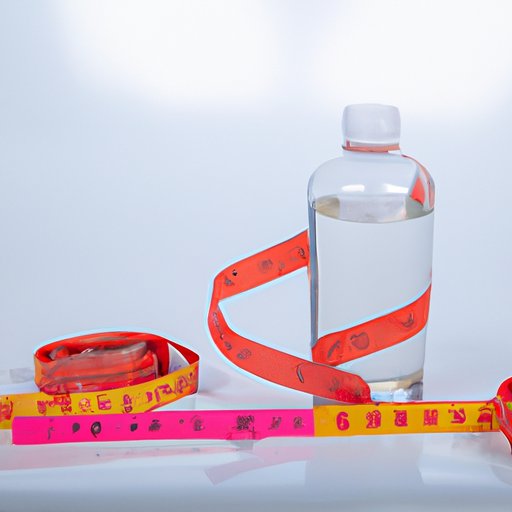
Introduction
Do you ever feel like you look “fat” even after eating healthy and exercising regularly? You may be experiencing water weight, a common problem caused by an imbalance in the body’s fluid levels. Water weight can affect anyone, regardless of their body size or weight, and can be frustrating for those trying to manage their appearance and overall wellbeing. In this article, we will explore the science behind water weight, its impact on your appearance, and provide tips for reducing water retention to improve your physique.
The Science Behind Water Weight
Water plays a critical role in the body, contributing to several key functions such as regulating body temperature, carrying nutrients to cells, and removing waste from the body. The human body typically contains about 60% water, with variations depending on factors such as age, sex, and body composition. When the body’s fluid levels are out of balance, excess water can accumulate in certain areas, leading to water weight.
The body retains and releases water through a complex system involving hormones and the kidneys. Hormones such as aldosterone and antidiuretic hormone (ADH) increase water retention in the body, while other hormones such as atrial natriuretic peptide (ANP) and brain natriuretic peptide (BNP) signal the kidneys to release excess water.
How Water Weight Can Affect Your Appearance
Water retention can cause bloating and puffiness, which may change the appearance of different parts of the body. For example, excess water in the abdomen may cause the stomach to look distended, while water retention in the legs can lead to swelling and discomfort. Additionally, water weight can cause changes in the appearance of the face, with puffiness and swelling around the eyes and cheeks.
Debunking the Myth: Does Water Weight Make You Look Fat?
While water weight can cause changes in the appearance of certain body parts, it is important to understand the difference between water weight and body fat. Water weight is temporary, and can often be reduced through changes in diet and lifestyle habits, while body fat is a more long-term concern that requires a consistent approach to healthy eating and exercise.
Some people may assume that water weight causes them to look “fat,” but this is not accurate. While water weight can cause puffy or bloated appearance, it does not contribute to long-term weight gain or affect body composition in the same way that excess body fat does.
The Role of Water Consumption in Weight Management
While drinking more water may seem counterintuitive for those experiencing water retention, it can actually help to reduce the problem. Proper hydration aids in kidney function, allowing the body to release excess fluid and promote overall fluid balance. Additionally, drinking water can help to replace sugary or salty fluids that contribute to water retention, leading to a healthier balance in the body’s fluid levels.
Drinking water can also support weight loss efforts, as it helps to promote feelings of fullness and reduce overall calorie intake. Studies have shown that individuals who drink more water tend to consume fewer calories overall, leading to improved weight loss outcomes over time.
Understanding Edema and Its Impact on Your Body Shape
Edema is a medical term used to describe water retention that is more severe or long-lasting. It can occur due to a variety of factors, including hormonal imbalances, heart or kidney problems, or reactions to certain medications. Edema can cause swelling and discomfort throughout the body, and may impact overall health and well-being in the long term.
Edema can also affect body shape, leading to changes in the appearance of different body parts. For example, edema in the legs may cause them to appear larger or more swollen, while edema in the abdomen may cause the stomach to look distended or bloated.
Simple Tips to Reduce Water Retention and Improve Your Physique
There are several practical steps that can be taken to reduce water retention and improve overall body appearance. These include:
- Reducing sodium intake, as excess salt can contribute to water retention
- Drinking more water to promote healthy fluid balance in the body
- Incorporating physical activity into daily routine to promote circulation and reduce fluid buildup
- Eating a balanced diet rich in fruits, vegetables, and lean proteins
- Avoiding carbonated drinks, which can increase bloating and gas
How to Tell the Difference Between Water Weight and Actual Body Fat
While water weight and body fat can contribute to changes in appearance and body shape, they are two distinct issues that require different approaches to management. One way to distinguish between the two is to measure body fat and fluid levels using specialized equipment such as a bioelectrical impedance scale or a DEXA scan.
It is important to understand that while reducing water weight may provide short-term relief, long-term success with weight management requires a comprehensive approach to overall health and wellness, including a balanced diet, regular exercise, and consistent self-care.
Conclusion
Water weight is a common concern for those trying to manage their appearance and improve overall health. While it can contribute to changes in body shape and overall well-being, it is important to understand the difference between water weight and body fat. By making simple changes to lifestyle and dietary habits, one can reduce water retention and promote healthy fluid balance in the body. We hope this article has provided insight into managing water weight and improving overall health and well-being.





